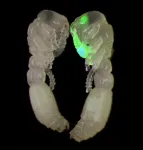(Press-News.org) Study shows improvements in depression and anxiety scores among individuals supplementing with probiotics alongside standard antidepressant medication
Data from a randomised double-blind placebo-controlled pilot trial published today in JAMA Psychiatry
A new study published today (14 June) in JAMA Psychiatry has found evidence that supplementing the diet with a probiotic blend containing 14 strains of bacteria can help individuals who are being treated for major depressive disorder with antidepressants. The research, led by the Institute of Psychiatry, Psychology & Neuroscience (IoPPN) at King’s College London and in partnership with ADM Protexin, part of ADM, demonstrated the potential of probiotic supplementation to support improvements in multiple depression and anxiety scores over an eight-week period.
The pilot study is one of the first trials in a Western population to show both good tolerability of probiotics and positive effects on mental health in adults with depression currently taking antidepressants. According to the researchers leading the study, the results provide a strong basis to further investigate the benefits of this probiotic food supplement for supporting mood and mental health in a larger trial.
There is increasing evidence that the gut microbiota (the vast and dynamic community of microorganisms inhabiting the gut) has a role to play in the regulation of mood. The study was a double-blind, randomised placebo-controlled study, designed as an initial exploration of whether improving gut health through the use of probiotics – supplements containing beneficial bacteria - could act as a new pathway for supporting mood and mental health.
In this pilot trial, 49 adults with diagnosed major depressive disorder and with an incomplete response to prescription antidepressants were provided with a widely available, proprietary 14 strain blend probiotic supplement or an identical placebo (24 receiving the probiotic). Over the course of eight weeks, both groups demonstrated improvement in their symptoms, but greater improvements were seen in the probiotic group from week four onwards. Meaningful reported improvements were seen, measured against gold standard rating scales for depression and anxiety.
Professor James Stone, the study’s senior investigator who began the work at King’s IoPPN and is now at Brighton and Sussex Medical School said, “Non- or partial response to antidepressants is a huge problem and this study is an important first step in exploring the therapeutic potential of probiotics as a treatment for depression. We found that probiotics were an acceptable and tolerable supplement in people already taking antidepressant medications. This now paves the way for studies looking at whether we see these beneficial effects of probiotics on depression and anxiety in larger populations of patients.”
Dr. Viktoriya Nikolova, the study’s first author from King’s IoPPN said, “The gut-brain axis is a truly fascinating and rapidly evolving area of microbiome research. The findings of this pilot study are an important step forward in our understanding of the role of probiotics in mood and mental health.”
Dr Richard Day, VP of Medical Affairs at ADM said, “According to the World Health Organisation, an estimated 5% of adults suffer from depression, with a significant number failing to respond completely to standard treatment options. This trial is one of the few clinical studies to assess the benefits of supplementing the diet with probiotics alongside standard of care antidepressant medication. These exciting results add to our understanding of the link between the gut microbiome and mental health.”
This study was possible thanks to an MRC Industrial CASE PhD Studentship with ADM Protexin as the industry partner, and charitable donations from Freya Green. It also received funding from the National Institute for Health and Care Research (NIHR) Biomedical Research Centre at South London and Maudsley NHS Foundation Trust and King’s College London.
Ends
Media contact
Amelia Remmington
King’s College London
amelia.remmington@kcl.ac.uk
07584 011592
Nikolova VL, Cleare AJ, Young AH, Stone JM. Acceptability, tolerability, and estimates of
putative treatment effects of probiotics as adjunctive treatment in patients with depression: a
randomized clinical trial. JAMA Psychiatry. Published online June 14, 2023.
doi:10.1001/jamapsychiatry.2023.1817
About King’s College London and the Institute of Psychiatry, Psychology & Neuroscience
King's College London is one of the top 35 universities in the world and one of the top 10 in Europe (QS World University Rankings, 2021/22) and among the oldest in England. King's has more than 33,000 students (including more than 12,800 postgraduates) from over 150 countries worldwide, and 8,500 staff. King's has an outstanding reputation for world-class teaching and cutting-edge research.
The Institute of Psychiatry, Psychology & Neuroscience (IoPPN) at King’s is a leading centre for mental health and neuroscience research in Europe. It produces more highly cited outputs (top 1% citations) on psychiatry and mental health than any other centre (SciVal 2021), and on this metric has risen from 16th (2014) to 4th (2021) in the world for highly cited neuroscience outputs. In the 2021 Research Excellence Framework (REF), 90% of research at the IoPPN was deemed ‘world leading’ or ‘internationally excellent’ (3* and 4*). World-leading research from the IoPPN has made, and continues to make, an impact on how we understand, prevent and treat mental illness, neurological conditions, and other conditions that affect the brain.
www.kcl.ac.uk/ioppn | Follow @KingsIoPPN on Twitter, Instagram, Facebook and LinkedIn
END
New data demonstrates potential role of probiotic supplementation in adults with Major Depressive Disorder
2023-06-14
ELSE PRESS RELEASES FROM THIS DATE:
Racial, ethnic, and socioeconomic differences in food allergies
2023-06-14
About The Study: This survey study of a nationally representative sample suggests that the prevalence of food allergies was highest among Asian, Hispanic, and non-Hispanic Black individuals compared with non-Hispanic white individuals in the U.S. Further assessment of socioeconomic factors and corresponding environmental exposures may better explain the causes of food allergy and inform targeted management and interventions to reduce the burden of food allergies and disparities in outcomes.
Authors: Ruchi S. Gupta, M.D., M.P.H., of the Northwestern University Feinberg School of Medicine in Chicago, is the corresponding ...
Physician, biomedical scientist harassment on social media during pandemic
2023-06-14
About The Study: Many physicians and scientists in this survey study reported being harassed on social media during the COVID-19 pandemic, often due to their advocacy and on the basis of gender, race, sexual orientation, or disability. Many reported sexual harassment and sharing of their private information.
Authors: Regina Royan, M.D., M.P.H., of the Northwestern University Feinberg School of Medicine in Chicago, is the corresponding author.
To access the embargoed study: Visit our For The Media website at this link https://media.jamanetwork.com/
(doi:10.1001/jamanetworkopen.2023.18315)
Editor’s ...
Key building block for life found at Saturn’s moon Enceladus
2023-06-14
SAN ANTONIO —Wednesday, June 14, 2023 —The search for extraterrestrial life in our solar system just got more exciting. A team of scientists including Southwest Research Institute’s Dr. Christopher Glein has discovered new evidence that the subsurface ocean of Saturn’s moon Enceladus contains a key building block for life. The team directly detected phosphorus in the form of phosphates originating from the moon’s ice-covered global ocean using data from NASA’s Cassini mission. Cassini explored Saturn and its system of rings and moons for over ...
Study shows psychedelic drugs reopen ‘critical periods’ for social learning
2023-06-14
Neuroscientists have long searched for ways to reopen “critical periods” in the brain, when mammals are more sensitive to signals from their surroundings that can influence periods of brain development. Now, researchers at Johns Hopkins Medicine say a new study in mice shows that psychedelic drugs are linked by their common ability to reopen such critical periods, but differ in the length of time the critical period is open — from two days to four weeks with a single dose.
The findings, published June 16 in the journal Nature, provide a new explanation for how psychedelic drugs work, say the scientists, and suggest potential to treat a wider ...
Building a new vaccine arsenal to eradicate polio
2023-06-14
Despite some of the most successful international vaccination campaigns in history, the poliovirus continues to circulate around the world, posing a threat of neurological damage and even paralysis to anyone who is not vaccinated.
While the original polio strains, called wildtype, have largely been eliminated, new strains can develop from the oral polio vaccine (OPV), which is the one most used in the developing world. Oral vaccines use live, weakened virus that occasionally mutates to an active form, leading to outbreaks even in countries believed to have eliminated polio.
Scientists at UCSF and the UK’s National Institute of Biological Standards and Control (NIBSC) have developed ...
Food allergy is highest among Hispanic, Black and Asian individuals
2023-06-14
· Many racial and ethnic groups not well aware of food allergies
· Lack of food allergy research in racial and ethnic communities
· ‘These individuals need to be aware so they can be diagnosed and treated’
CHICAGO --- Food allergy has not been on the radar of most racial and ethnic communities. But a new Northwestern Medicine study — the first population-based food allergy study in the U.S. to explore racial and ethnic differences in all age groups — shows why it should be.
The new study found the prevalence of food allergy is highest among Hispanic, non-Hispanic Black and ...
World’s first transgenic ants reveal how colonies respond to an alarm
2023-06-14
Ants navigate their richly aromatic world using an array of odor receptors and chemical signals called pheromones. Whether foraging or defending the nest, mating or tending to their young, ants both send and receive chemical signals throughout their lives. The importance of this system is underscored by how well equipped the ant brain is to process the abundance of scents: The olfactory processing center in the ant’s brain has 10 times as many subdivisions as fruit flies do, for example, even though their brains are about the same size.
And yet how the ant olfactory system encodes scent data has remained largely unknown. To whittle ...
For experimental physicists, quantum frustration leads to fundamental discovery
2023-06-14
AMHERST, Mass. – A team of physicists, including University of Massachusetts assistant professor Tigran Sedrakyan, recently announced in the journal Nature that they have discovered a new phase of matter. Called the “chiral bose-liquid state,” the discovery opens a new path in the age-old effort to understand the nature of the physical world.
Under everyday conditions, matter can be a solid, liquid or gas. But once you venture beyond the everyday—into temperatures approaching absolute zero, things smaller than a fraction ...
Metamaterials with built-in frustration have mechanical memory
2023-06-14
Researchers from the UvA Institute of Physics and ENS de Lyon have discovered how to design materials that necessarily have a point or line where the material doesn’t deform under stress, and that even remember how they have been poked or squeezed in the past. These results could be used in robotics and mechanical computers, while similar design principles could be used in quantum computers.
The outcome is a breakthrough in the field of metamaterials: designer materials whose responses are determined by their structure rather than their chemical composition. To construct a metamaterial with mechanical memory, physicists ...
Earth was created much faster than we thought. This makes the chance of finding other habitable planets in the Universe more likely
2023-06-14
When we walk around in our everyday life, we might not think of the Earth itself very often. But this planet is the foundation of our life. The air we breathe, the water we drink and the gravity that pins us to the ground.
Up until now, researchers believed that it took more than 100 million years for the Earth to form. And it was also common belief that water was delivered by lucky collisions with water-rich asteroids like comets.
However, a new study from the University of Copenhagen suggests that it might not have happened entirely by chance.
“We show that the Earth formed by the very ...



